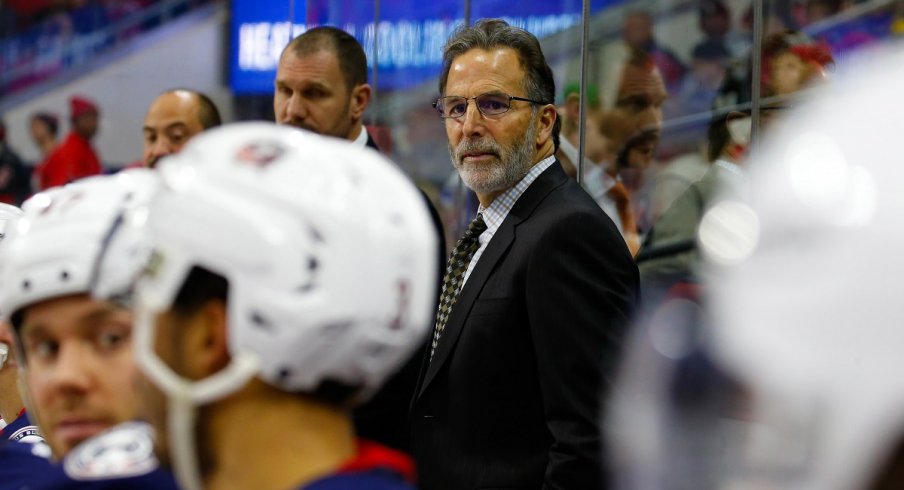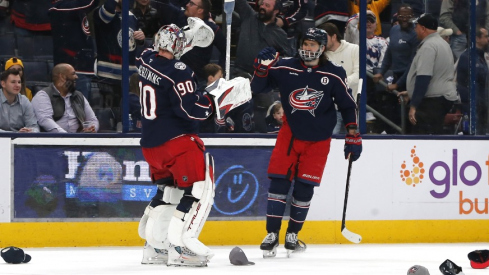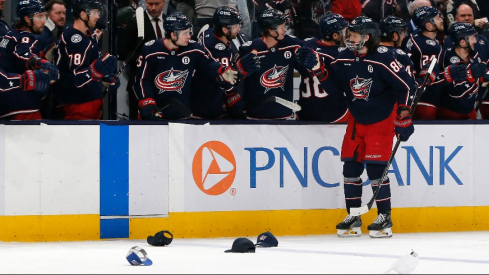John Tortorella and Ken Hitchcock will forever be connected in Columbus Blue Jackets lore. Both are former Stanley Cup champions known (fairly or not) for their fiery tempers and defensive/structured brand of hockey. Most notably, both took struggling franchise's to the Stanley Cup Playoffs early on in their tenure with the team.
Hitchcock, who will be beginning his second stint as head coach of the Dallas Stars this upcoming season, took over as Blue Jackets head coach Gerard Gallant (and for five games, Gary Agnew) in November of 2006. He took the team to a 28-29-5 finish, but the team missed the playoffs. Worth noting, the franchise had still not made the playoffs to this point.
Tortorella 1 of only 3 current coaches to be a 4-time finalist for the Jack Adams. #Stars Ken Hitchcock and #NYR Alain Vigneault the others.
— Aaron Portzline (@Aportzline) June 18, 2017
The next season, 2007-08, the team finished with the highest point total in club history (80), but still missed the playoffs. The next season, however, Hitchcock brought the Jackets to the playoffs for the first time in Blue Jackets history, though the team was promptly swept by the Detroit Red Wings.
In February of the next season, however, Hitchock's tenure with the team came to an abrupt end. He was fired midway through the season after starting 22-27-9, second to last in the Western Conference. Even so, his legacy with the team is profound: he was the first coach to bring the Blue Jackets to the playoffs. He won his 500th game with Columbus and brought a level of credibility throughout that had previously been lacking.
It wasn't until five seasons later than the Blue Jackets made it to the playoffs again, this time under the tutelage of Todd Richards. But after a disastrous 0-7-0 start to begin the 2015-16 season, he was replaced by John Tortorella. Then, as you well know, Tortorella took his team to the Playoffs this past season.
But of the two, who did the better job? Who was able to turn more around with less?
Hitchcock inherited a tire fire of a team in 2006. Heck, he was the third coach of the team that season when he was hired by Thanksgiving. David Vyborny led the team with 64 points, Rick Nash paced the club with 27 goals, and 33-year old Fredrik Norrena played in 55 games that year. It's a miracle, honestly, that this team finished with 73 points, good (bad) enough for 24th in the league.
(Next time a Blackhawks fan chides you for your team's lack of success, remind them that just a decade ago, a team that went through three coaches and that was led by David Vyborny and Freddy Norrena, had more points than the 'Hawks.)
Just two short seasons later, though, the makeup of this team was almost unrecognizable. Enter Calder Trophy-winning netminder Steve Mason, who took the NHL by storm. Nash, at this point a 24-year old vet, posted a career high 79 points, including 40 goals. This team also had some young pieces, namely Jakub Voracek, Kris Russell, and Derrick Brassard, that helped supplement a veteran core of players that included R.J. Umberger, Kristian Huselius, and Fedor Tyutin.
That Blue Jackets team didn't stand a shot against a dynamic Detroit team that finished one game away from winning the Stanley Cup. After that season, Hitchcock was unable to take his Jackets back to the promised land.
Conversely, Tortorella, too, inherited a team in the dumps. After a historically poor start, the Jackets were in need of a new, stronger voice. His hiring, similar to Hitchcock's nearly a decade earlier, immediately gave the team and franchise in general a new direction - a literal adjustment of the mindset of winning in the NHL.
To put it bluntly, Tortorella was brought in to fix the culture in Columbus. Management had given plenty mulligans over the years, but decided that bringing in a man like Tortorella would emphatically put an end to that. His first year, similar to Hitchcock's first partial year, was close to .500, going 34-33-8.
The next season (read: last season), Tortorella took his Columbus squad to the best season in franchise history in virtually every metric: most wins, most points, and highest place finish in the league. Tortorella, like Hitchcock before him, secured his 500th win in the NHL behind the bench while coaching the Blue Jackets, the first American-born coach to reach the plateau.
Tortorella's 2015 team was significantly better than the team that Hitchcock took over for in 2006. Though Brandon Saad and Cam Atkinson co-led the team in points with just 53, they did have two 30-goal scorers (Atkinson and Boone Jenner). And despite the injury that hampered much of Sergei Bobrovsky's season, Joonas Korpisalo filled in admirably in his stead. Also, keep in mind that this was a team that had finished 42-35-5 the year prior, a far cry from the 2005-06 Blue Jackets that went 35-43-4. The talent was there; the execution was the issue.
It's hard to say which of the two coaches is most deserving of praise. Both were thrust into a head coaching position midway through a season, where the team was in complete and utter disarray. On the one hand, Tortorella appears to have had a better, deeper roster, but also parlayed that into the best season (by a long shot) in club history. He also did it in one less year than Hitchcock. On the other, Hitchcock was given a relatively bleak roster initially and was the first Columbus coach to break 80 points, let alone make the playoffs.
But this story is still incomplete. Hitchcock coached a club record 284 games with the team, not even four full years. Tortorella is surely expected to match - if not far exceed - that franchise record.
In the history of the Columbus Blue Jackets, both regular seasons directly following playoff berths turned quickly into disappointing seasons. Coach Tortorella now has the challenging task of taking the first-next step in Blue Jackets team history.


